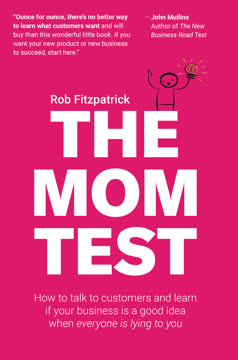Key Takeaways
1. Entrepreneurial success is a matter of decision and determination
"The willingness to do whatever it takes is infinitely more important than knowing everything there is to know about how to do it."
Embrace the entrepreneurial mindset. Success in business starts with a firm decision to succeed and the determination to overcome obstacles. This mindset involves developing mental toughness, embracing risk, and being willing to learn and adapt.
Overcome limiting beliefs. Successful entrepreneurs challenge conventional wisdom and reject limitations imposed by others. They understand that success is not predetermined by genetics, upbringing, or education, but by their own decisions and actions.
Key attitudes:
- Believe in your ability to succeed
- Be willing to work harder than others
- Embrace failure as a learning opportunity
- Develop resilience and persistence
2. Real entrepreneurial experience involves overcoming challenges and failures
"Even with success, there is failure."
Expect challenges. The entrepreneurial journey is filled with obstacles, setbacks, and failures. Successful entrepreneurs understand that these challenges are part of the process and use them as opportunities for growth and improvement.
Learn from failures. Every successful entrepreneur has experienced failures along the way. The key is to learn from these experiences, adapt, and keep moving forward. Resilience and the ability to bounce back from setbacks are crucial traits for long-term success.
Common challenges:
- Cash flow problems
- Market competition
- Regulatory hurdles
- Personnel issues
- Economic downturns
3. Test and validate your business ideas before fully committing
"Dan Kennedy's Eternal Truth #5: You cannot trust your own judgment. Test, test, test. Then test some more."
Validate your ideas. Before investing significant time and resources into a business idea, it's crucial to test and validate it in the market. This process helps identify potential issues, refine the concept, and increase the chances of success.
Use practical testing methods. There are various ways to test business ideas, from simple surveys to more elaborate prototypes and pilot programs. The goal is to gather real-world feedback and data to inform your decisions.
Testing methods:
- Customer surveys
- Prototype development
- Small-scale pilot programs
- A/B testing
- Crowdfunding campaigns
4. Position yourself and your business for maximum success
"To be perceived, without risk of exception, as successful and trustworthy in your field, you must match the image of a successful person in your field."
Craft your image. How you present yourself and your business can significantly impact your success. This includes your personal appearance, business name, marketing materials, and overall brand image.
Develop a unique selling proposition. Clearly communicate what sets you apart from competitors and why customers should choose your business. This positioning strategy should be reflected in all aspects of your business, from marketing to customer service.
Key positioning elements:
- Business name and branding
- Pricing strategy
- Marketing messages
- Customer experience
- Personal appearance and demeanor
5. Entrepreneurs make big money through innovative ideas and customer value
"The Fortune-Building Secret of Total Customer Value"
Focus on innovation. Successful entrepreneurs constantly seek new ways to create value for their customers. This can involve developing new products, improving existing services, or finding innovative solutions to problems.
Maximize customer value. Understanding and maximizing the total value of each customer is crucial for long-term success. This involves not only providing excellent products or services but also developing strategies to increase customer retention, upsells, and referrals.
Strategies for increasing customer value:
- Cross-selling and upselling
- Loyalty programs
- Personalized services
- Referral incentives
- Continuous improvement based on customer feedback
6. Master the art of selling to succeed in business
"To be convincing, you have to be convinced."
Develop a sales mindset. Successful entrepreneurs understand that selling is a crucial part of business success. This involves not only selling products or services but also selling ideas, visions, and yourself as a leader.
Improve your sales skills. Continuously work on improving your ability to communicate value, overcome objections, and close deals. This skill set is valuable in all aspects of business, from attracting investors to negotiating with suppliers.
Key sales skills:
- Active listening
- Effective communication
- Empathy and relationship building
- Problem-solving
- Negotiation
7. Manage cash flow and productivity for sustainable growth
"Cash is king."
Prioritize cash flow management. Maintaining positive cash flow is crucial for business survival and growth. This involves carefully managing expenses, optimizing payment terms with suppliers and customers, and having strategies in place to handle cash flow fluctuations.
Maximize productivity. Efficient use of time and resources is essential for business success. Develop systems and processes to streamline operations, delegate effectively, and focus on high-value activities.
Cash flow management strategies:
- Regular cash flow forecasting
- Negotiating favorable payment terms
- Implementing effective collections processes
- Maintaining cash reserves
- Exploring alternative financing options
8. Build a mini-conglomerate to create multiple income streams
"A 'normal' small business can only yield a 'normal' small business income. To earn an extraordinary income, you must develop an extraordinary business!"
Diversify your business interests. Creating a mini-conglomerate of related businesses can help you maximize opportunities and create multiple income streams. This approach allows you to leverage existing resources and relationships to build a more robust and profitable enterprise.
Look for synergies. When expanding your business interests, focus on opportunities that complement and support your existing operations. This can lead to increased efficiency, cross-selling opportunities, and enhanced customer value.
Mini-conglomerate strategies:
- Vertical integration
- Horizontal expansion
- Strategic partnerships and joint ventures
- Developing complementary products or services
- Creating a platform for multiple businesses
9. Use your business as a path to financial independence
"Don't let your business own you."
Build systems for independence. To achieve true financial independence through your business, focus on creating systems and processes that allow the business to operate without your constant involvement. This involves delegating responsibilities, documenting procedures, and developing a strong team.
Plan for the long-term. From the beginning, think about how your business can serve as a vehicle for achieving your personal financial goals. This may involve strategies for building equity, creating passive income streams, or positioning the business for a future sale.
Steps toward financial independence:
- Develop a clear exit strategy
- Invest in training and empowering your team
- Create scalable systems and processes
- Diversify your personal investments outside the business
- Continuously evaluate and adjust your business model for long-term sustainability
Last updated:
Review Summary
Readers highly rate "No B.S. Business Success In the New Economy", praising its practical advice and provocative insights. The book emphasizes entrepreneurial mindset, problem-solving, and taking responsibility. Kennedy challenges readers to rethink their approach to business, friends, and lifestyle choices. He advocates for continuous testing, quality over price, and customer acquisition. Readers appreciate Kennedy's straightforward style, personal philosophy, and real-world experience. The book is seen as valuable for both aspiring and established entrepreneurs.
Similar Books










Download PDF
Download EPUB
.epub digital book format is ideal for reading ebooks on phones, tablets, and e-readers.














